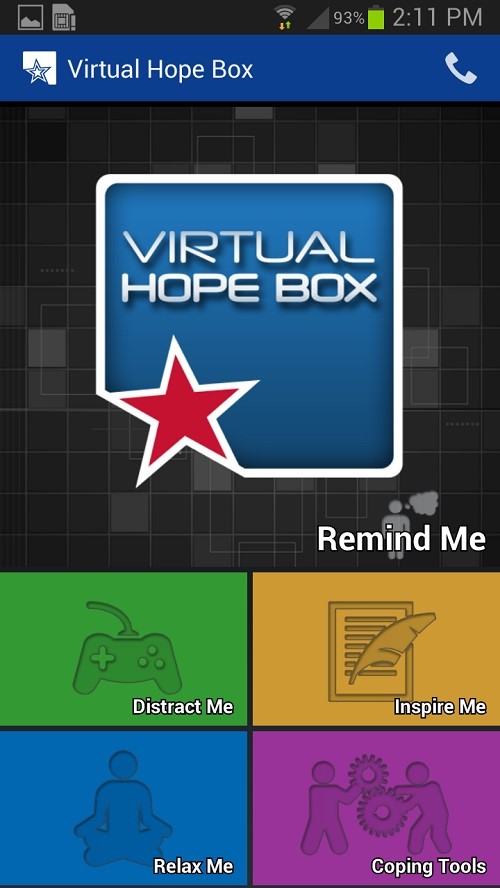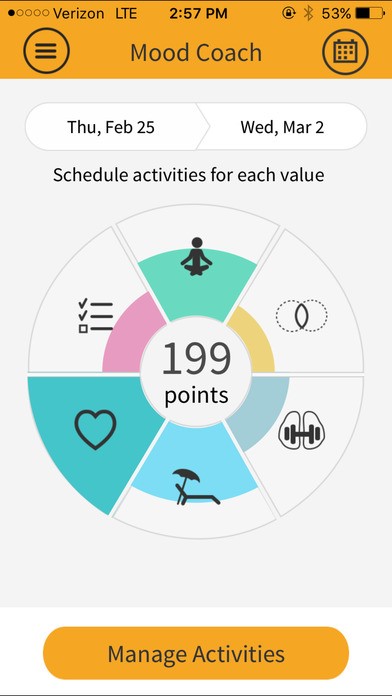Staff Perspective: Mood Coach and Virtual Hope Box Apps
 Smart phone are becoming more and more of an integral part of our lives every day. These enable the use of a wide variety of apps, many of which can be used by both behavioral health providers and their clients to assist in treatment, both in and outside of sessions. We keep an eye out for these and when we encounter ones we find especially useful, we like to share them fellow providers. We've got two new ones to talk about today, the Virtual Hope Box and Mood Coach apps.
Smart phone are becoming more and more of an integral part of our lives every day. These enable the use of a wide variety of apps, many of which can be used by both behavioral health providers and their clients to assist in treatment, both in and outside of sessions. We keep an eye out for these and when we encounter ones we find especially useful, we like to share them fellow providers. We've got two new ones to talk about today, the Virtual Hope Box and Mood Coach apps.
Virtual Hope Box (VHB) – is intended to help patients who are already engaged in treatment by helping to decrease the subjective experience of distress. The app facilitates adaptive coping and emotion regulation skills. The VHB uniquely applied technology to support behavior health earning the app the 2014 Department of Defense Innovation Award. When using the app, patients can personalize the content, including adding custom supportive media (i.e., pictures, songs, videos).
The Virtual Hope Box has four main categories. First, the Distract Me area, users will have access to games that can shift their attention away from upsetting thoughts or experiences. Second, the Inspire Me area, patients will be able to read inspirational quote and can save meaningful quotes of their own as well. Next, relaxation and meditation exercises are found in the Relax Me area of the app. Finally, the Coping Tools area includes Coping Cards and an activity planner.
The app was created by the National Center for Telehealth and Technology (T2) and is available on Apple/iOS and Android platforms for free.
 Mood Coach – is an app developed to help people learn and practice Behavioral Activation to reduce or eliminate symptoms of depression. The user identifies their top six life areas/values (e.g., intimate relationships, leisure/recreation, physical health, etc.) and chooses from a list of positive activities associated with each of these values/life areas. The user rates each activity on a scale of 0-10 according to how difficult, fun, and important they are to the individual.
Mood Coach – is an app developed to help people learn and practice Behavioral Activation to reduce or eliminate symptoms of depression. The user identifies their top six life areas/values (e.g., intimate relationships, leisure/recreation, physical health, etc.) and chooses from a list of positive activities associated with each of these values/life areas. The user rates each activity on a scale of 0-10 according to how difficult, fun, and important they are to the individual.
The user can also practice activity scheduling by setting a date and time for completing the activity. Additionally, the app offers access to the PHQ-9 depression screening tool and a daily mood rating tool. The app provides psychoeducation for users about depression, behavioral activation, and other related topics.
The app was created by the US Department of Veterans Affairs- National Center for PTSD and is available on Apple/iOS.
For even more useful apps, head over to the "Apps and Technological Resources" section of the site.
The opinions in CDP Staff Perspective blogs are solely those of the author and do not necessarily reflect the opinion of the Uniformed Services University of the Health Science or the Department of Defense.
Erin Frick, Psy.D., is an Evidence-Based Psychotherapy (EBP) Champion-Consultant with the Center for Deployment Psychology (CDP) at the Uniformed Services University of the Health Sciences in Bethesda, Maryland
 Smart phone are becoming more and more of an integral part of our lives every day. These enable the use of a wide variety of apps, many of which can be used by both behavioral health providers and their clients to assist in treatment, both in and outside of sessions. We keep an eye out for these and when we encounter ones we find especially useful, we like to share them fellow providers. We've got two new ones to talk about today, the Virtual Hope Box and Mood Coach apps.
Smart phone are becoming more and more of an integral part of our lives every day. These enable the use of a wide variety of apps, many of which can be used by both behavioral health providers and their clients to assist in treatment, both in and outside of sessions. We keep an eye out for these and when we encounter ones we find especially useful, we like to share them fellow providers. We've got two new ones to talk about today, the Virtual Hope Box and Mood Coach apps.
Virtual Hope Box (VHB) – is intended to help patients who are already engaged in treatment by helping to decrease the subjective experience of distress. The app facilitates adaptive coping and emotion regulation skills. The VHB uniquely applied technology to support behavior health earning the app the 2014 Department of Defense Innovation Award. When using the app, patients can personalize the content, including adding custom supportive media (i.e., pictures, songs, videos).
The Virtual Hope Box has four main categories. First, the Distract Me area, users will have access to games that can shift their attention away from upsetting thoughts or experiences. Second, the Inspire Me area, patients will be able to read inspirational quote and can save meaningful quotes of their own as well. Next, relaxation and meditation exercises are found in the Relax Me area of the app. Finally, the Coping Tools area includes Coping Cards and an activity planner.
The app was created by the National Center for Telehealth and Technology (T2) and is available on Apple/iOS and Android platforms for free.
 Mood Coach – is an app developed to help people learn and practice Behavioral Activation to reduce or eliminate symptoms of depression. The user identifies their top six life areas/values (e.g., intimate relationships, leisure/recreation, physical health, etc.) and chooses from a list of positive activities associated with each of these values/life areas. The user rates each activity on a scale of 0-10 according to how difficult, fun, and important they are to the individual.
Mood Coach – is an app developed to help people learn and practice Behavioral Activation to reduce or eliminate symptoms of depression. The user identifies their top six life areas/values (e.g., intimate relationships, leisure/recreation, physical health, etc.) and chooses from a list of positive activities associated with each of these values/life areas. The user rates each activity on a scale of 0-10 according to how difficult, fun, and important they are to the individual.
The user can also practice activity scheduling by setting a date and time for completing the activity. Additionally, the app offers access to the PHQ-9 depression screening tool and a daily mood rating tool. The app provides psychoeducation for users about depression, behavioral activation, and other related topics.
The app was created by the US Department of Veterans Affairs- National Center for PTSD and is available on Apple/iOS.
For even more useful apps, head over to the "Apps and Technological Resources" section of the site.
The opinions in CDP Staff Perspective blogs are solely those of the author and do not necessarily reflect the opinion of the Uniformed Services University of the Health Science or the Department of Defense.
Erin Frick, Psy.D., is an Evidence-Based Psychotherapy (EBP) Champion-Consultant with the Center for Deployment Psychology (CDP) at the Uniformed Services University of the Health Sciences in Bethesda, Maryland

